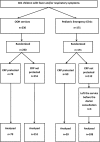Out-of-hours antibiotic prescription after screening with C reactive protein: a randomised controlled study
- PMID: 27173814
- PMCID: PMC4874126
- DOI: 10.1136/bmjopen-2016-011231
Out-of-hours antibiotic prescription after screening with C reactive protein: a randomised controlled study
Erratum in
-
Correction: Out-of-hours antibiotic prescription after screening with C reactive protein: a randomised controlled study.BMJ Open. 2016 Sep 9;6(9):e011231corr1. doi: 10.1136/bmjopen-2016-011231corr1. BMJ Open. 2016. PMID: 27612534 Free PMC article. No abstract available.
Abstract
Objective: To evaluate the effect of preconsultation C reactive protein (CRP) screening on antibiotic prescribing and referral to hospital in Norwegian primary care settings with low prevalence of serious infections.
Design: Randomised controlled observational study at out-of-hours services in Norway.
Setting: Primary care.
Participants: 401 children (0-6 years) with fever and/or respiratory symptoms were recruited from 5 different out-of-hours services (including 1 paediatric emergency clinic) in 2013-2015.
Intervention: Data were collected from questionnaires and clinical examination results. Every third child was randomised to a CRP test before the consultation; for the rest, the doctor ordered a CRP test if considered necessary.
Outcome measures: Main outcome variables were prescription of antibiotics and referral to hospital.
Results: In the group pretested with CRP, the antibiotic prescription rate was 26%, compared with 22% in the control group. In the group pretested with CRP, 5% were admitted to hospital, compared with 9% in the control group. These differences were not statistically significant. The main predictors for ordering a CRP test were parents' assessment of seriousness of the illness and the child's temperature. Paediatricians ordered CRP tests less frequently than did other doctors (9% vs 56%, p<0.001).
Conclusions: Preconsultation screening with CRP of children presenting to out-of-hours services with fever and/or respiratory symptoms does not significantly affect the prescription of antibiotics or referral to hospital.
Trial registration number: NCT02496559; Results.
Keywords: C-reactive protein; PRIMARY CARE; Prescriptions; Referral and Consultation.
Published by the BMJ Publishing Group Limited. For permission to use (where not already granted under a licence) please go to http://www.bmj.com/company/products-services/rights-and-licensing/
Figures
References
-
- NORM/NORM-VET. Usage of antimicrobial agents and occurrence of antimicrobial resistance in Norway. Norwegian surveillance system for antimicrobial resistance (NORM) and Norwegian surveillance system for antimicrobial resistance in veterinary and food production sectors (NORM-VET). Norwegian Veterinary Institute, 2013.
-
- Sakshaug S, ed. Drug Consumption in Norway 2009–2013 (Legemiddelforbruket i Norge 2009–2013), Norwegian Institute of Public Health, Oslo, legemiddelstatistikk 2014:1.
Publication types
MeSH terms
Substances
Associated data
LinkOut - more resources
Full Text Sources
Other Literature Sources
Medical
Research Materials
Miscellaneous

